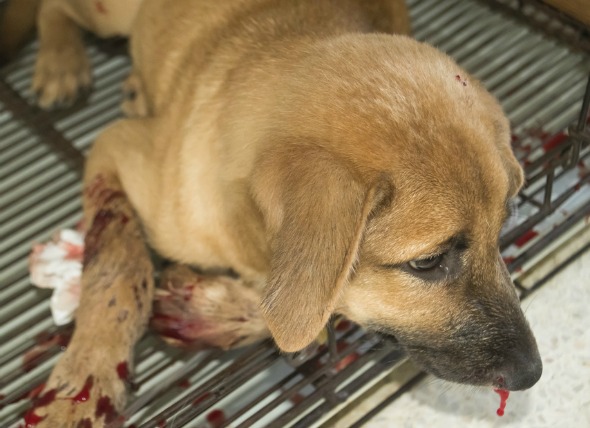Nosebleeds are called epistaxis and, in dogs, can have several causes, from the most benign, such as an infection, to the most severe, such as poisonings or clotting problems. In this article by Animal Expert we will explain the possible causes of bleeding from your dog’s nose.
We must say that if seeing a dog bleed from the nose tends to be alarming, in most cases epistaxis is caused by benign and easily treatable conditions. In other cases, the veterinarian will be responsible for the diagnosis and treatment.
- Some infections that affect the nasal or even oral area may explain why a dog bleeds from the nose.
- Your puppy may bleed from the nose and have difficulty breathing.
- Making noises when inhaling and exhaling.
- Sometimes you can also see your dog bleeding from the nose and coughing.
The inside of the nose is covered by a mucous membrane highly irrigated by the blood vessels. Therefore, its erosion, due to various factors such as chronic infections caused by bacteria or fungi, can cause bleeding.
Other times, the infection does not occur in the nasal area, but in the mouth. A dental abscess, for example, can cause nosebleeds. If this abscess breaks in the nasal cavity, it causes an oronasal fistula that will present symptoms such as unilateral nasal discharge and sneezing, especially after the dog has fed. These infections should be diagnosed and treated by the veterinarian.
Another common explanation for a dog that bleeds from the nose is the presence of a foreign object inside. In these cases, it is common to see the dog bleed from the nose when sneezing, as the main sign that the equipment is lodged in the dog’s nose is a sudden attack of sneezing. On the nose of the dog it is possible to find foreign objects such as ears, seeds, fragments of bones or wood chips.
Its presence irritates the mucous membranes and causes the dog to rub the nose with the legs or against any surface in an attempt to get rid of the discomfort. Sneezing and injuries that can cause some of these foreign bodies are responsible for the nasalble that sometimes occurs. If you can see the object inside your nostrils with the naked eye, you can try removing it with pliers. Otherwise, you should go to your veterinarian to remove it, as an object lodged in your nostrils can cause problems such as infections.
If you notice a lump on the dog’s nose you should consult the veterinarian, as it may be a nasal polyp or a tumor, conditions that can also cause nosebleeds, in addition to obstructing, to a greater or lesser extent, the passage of air. . Sinus and sinus tumors occur most often in older dogs. In addition to bleeding and noise due to plugging, you may notice nasal discharge and sneezing. The treatment of choice is usually surgery, and polyps, which are not cancerous, may be recurrent. The prognosis of the tumors will depend on whether they are benign or malignant, something your veterinarian will determine with a biopsy.
Another possible cause of nosebleeds in a dog are bleeding disorders. For clotting to occur, several elements must be present in the blood. When one of them is missing, spontaneous bleeding may occur.
Sometimes this deficiency can be caused by poisoning. For example, some raticides prevent the dog’s body from producing vitamin K, an essential substance for proper clotting. Deficiency of this vitamin causes nosebleeds, rectal, vomiting with blood, bruising, etc. These cases are veterinary emergencies.
Sometimes these bleeding disorders are hereditary, as may be the case with von Willebrand disease. In this condition, which can affect both men and women, there is platelet dysfunction that can manifest in nosebleeds and gums or blood in stool and urine, although bleeding is often not noticeable and also decreases with age. .
Hemophilia also affects clotting factors, but the disease only occurs in men. There are other clotting deficits, but they are less common. Diagnoses of these conditions are made by specific blood tests. In case of severe bleeding, blood transfusions are necessary.
Finally, there is an acquired but non-hereditary bleeding disorder called disseminated intravascular coagulation (HDI) that manifests in certain situations, such as infections, sunstroke, shock, etc. in the form of bleeding from the nose, mouth, gastrointestinal tract, etc., constituting an extremely serious disorder that usually results in the death of the dog.
This article is for informational purposes only, in Animal Expert.com.br we cannot prescribe veterinary treatments or make any kind of diagnosis. We suggest that you take your pet to the veterinarian in case of any type of condition or discomfort.
If you would like to read articles similar to, we recommend that you visit our Other Health Problems section.

